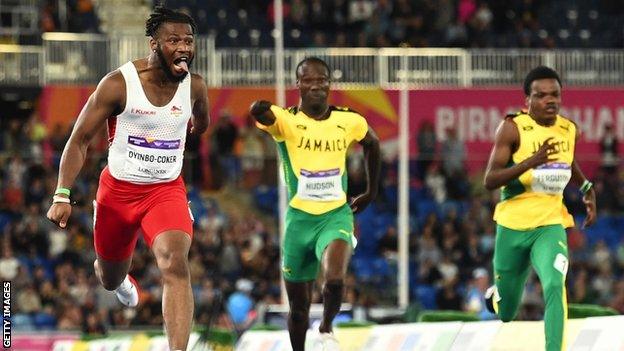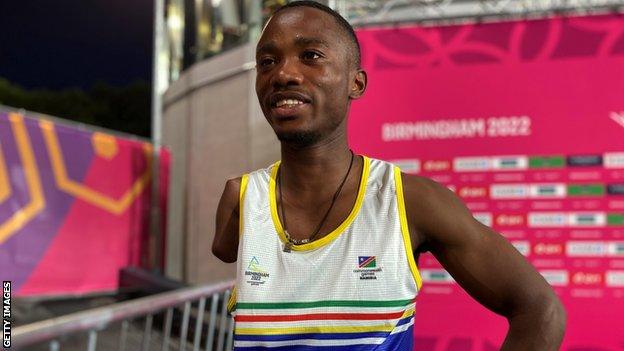Commonwealth Games: Call for other events to host Para-sports at same time
- Published

Bradley Murere's category, the T45-47 100m, was won at the Commonwealth Games by England's Emmanuel Oyinbo-Coker (left)
Namibian runner Bradley Murere has called for more international events to follow the Commonwealth Games and consider hosting Para-sports alongside able-bodied competitions.
The 19-year-old ran in the men's T45-47 100m in Birmingham last week, which was held in the same session as the men's 10,000m final and the women's heptathlon 200m featuring eventual champion Katarina Johnson-Thompson.
"Put amongst all the able-bodied athletes although we look different, we don't feel different," Murere told BBC Sport Africa.
"And I really like that about this Commonwealth Games. From my point of view as a Para-athlete, it gives me more confidence,
"That combination is awesome. Wherever they don't have it, they should bring it."
Birmingham had featured a record 42 Para-sport events across eight sports, with over 350 athletes taking part in a fully-integrated programme.
However, the 2024 Paris Paralympics will have 549 medal events with around 4,400 athletes plus support staff in attendance.
Murere's comments came before the International Paralympic Committee said Paralympic growth could be "jeopardised" if the Games was to be merged with the Olympics.
Yet the Namibian believes Para-athletes greatly benefit from the exposure they get at joint events.
"I watched the Olympics last year, and the World Championships, and everything was done separately," he said.
"That separation, I really don't like. I would encourage them to merge.
"Mingling with and meeting the other athletes, you learn from them as well. I saw a difference when all the other able-bodied athletes are with us.
"It makes us feel more open, we can interact more because they also want to learn about us, because it's not every day that they get to live amongst Para-athletes. We don't feel separated from them - we feel as a unit."
The Paralympic Games traditionally takes place around two weeks after the Olympic Games, while the next Para-athletics World Championships are not due to be held until next July in Paris.
The 2022 event scheduled to take place in Kobe, Japan, later this month - which would have been almost five weeks after the World Athletics Championships in Eugene - has been postponed until 2024.
Performing on the big stage

Bradley Murere says his aunt encouraged him to take up para-athletics
Murere finished fifth in the final in 11.62 seconds on what was his Commonwealth Games debut, competing as one of just two Namibian Para-athletes with the other, Ananias Shikongo, winning bronze in the T11/12 100m.
Murere's face displayed a beaming smile in the mixed zone after competing at the Alexander Stadium, which he described as a "wild experience" as he continued to soak in the cheers.
"It's good that I got this kind of competition to feel how it is on a bigger stage," he added.
"With the fans and all the love that people show for the Games, it makes me feel more comfortable and relaxed being here. I feel more positive."
The teenager has an acquired limb deficiency, having lost his right arm in a traffic accident in 2012.
"That's one of the most tough [events], if not the toughest in Para-athletics," he said.
"I think the fact that we have a limb missing makes a lot of people look down on us, but that gives us more fuel.
"It gives us more energy, more drive, to push harder and work harder. That's why our times are way up there compared to all the other athletes."
Drawing inspiration from his aunt
Murere started competing in 2017 at national level in Namibia, and the following year he was selected for the national team.
He was influenced to take up Para-athletics in the coastal city of Swakopmund by his aunt Petronella Uiras, a former sprinter who competed in the 1980s and early 1990s.
However, he was unaware of his aunt's achievements when he was a youngster.
"Growing up, I always thought about Usain Bolt, Yohan Blake and all those top Jamaican sprinters and Justin Gatlin," he said.
"I never saw what my aunt was doing because I focused mostly on the other athletes. In school, we learn about our idols, our role models, and mostly when they speak about role models, they don't really include family that much.
"They talk about top athletes, famous business people, musicians, and they don't really mention anything about your household.
"My aunt slowly groomed me to become the athlete I am today. She would always come to training when I was younger.
"I felt like I was different from all the other kids. It was different and new to see someone with one arm and I really didn't feel comfortable back then.
"But she made the sacrifice and always came by to watch me train. And she always encouraged me - I owe it to her."
Murere's career has progressed well since making his senior debut for Namibia, winning a silver medal in the T46 200m and a bronze medal in the T46 100m at the 2018 Grand Prix in Berlin.
At the World Championships in Dubai in 2019, he failed to progress from his heat but ran a personal best of 11.52, and later the same year he was named junior male Para-athlete of the Year at the Namibia Sports Awards.
After his showing in Birmingham, Murere hopes he will be able to inspire the youth of Namibia - on the track and off it.
"Athletics has taught me discipline, patience and faith," he said. "My dream is to inspire youth, not just Para-athletes or people with disability, but everyone else out there who needs someone.
"We all just need something nice, to hear something nice, to get us going through a bad day. And my dream is also to become one of the best."